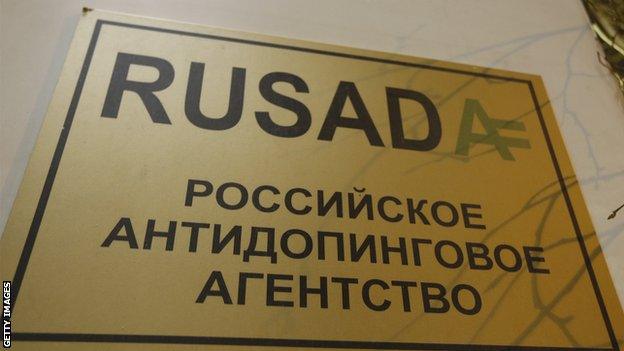Russian doping scandal: Russian athletes remain suspended after Wada launches action
- Published

Rusada's suspension was imposed in November 2015
Russian athletes remain suspended for the World Athletics Championships in Doha, the IAAF has confirmed.
It follows the World Anti-Doping Agency's decision to open compliance proceedings against the Russian Anti-Doping Agency (Rusada).
Wada, the body set up to combat drug cheating in sport, says Russian officials handed over data which contained "inconsistencies".
It suspects data may have been manipulated before being passed on.
Russia was asked to hand over data from its Moscow laboratory to show it complied with global anti-doping rules.
It was a key step taken towards Russia's reintegration back into the sporting fold following its suspension over a state-sponsored doping programme.
Wada said on Monday its executive committee "was informed that further investigation of inconsistencies in Moscow laboratory data had led Wada to open a formal compliance procedure against Rusada".
The body says it is "pursuing the matter robustly" and Russia has been given three weeks to explain the inconsistencies.
The International Association of Athletics Federations confirmed its decision to uphold Russia's ban four days before the start of the championships in Doha after hearing a report from its task force overseeing Russia's reinstatement efforts.
In comments reported by the Russian news agency Tass, the country's sports minister Pavel Kolobkov said: "What exactly are these discrepancies and what are they related to?
"Experts in digital technology from both sides are already in collaboration. For our part, we continue to provide all possible assistance."
Russia had missed deadlines to hand over the data before finally granting Wada access to the Moscow anti-doping laboratory in January.
BBC Sport understands that senior Wada officials were briefed last month that the organisation's experts had found evidence some data may have been manipulated before being passed over to an inspection team.
Sir Craig Reedie, president of the International Olympic Committee, described the development as "disappointing but not an embarrassment".
"The whole point of the exercise was to get access to the information so that we could then put together cases that international federations could prosecute against people that have been cheating," he added.
"We've now found some inconsistencies, we're going to deal with it, we're going to deal with it properly."
Rob Koehler, a former Wada executive who now heads up Global Athlete, a group that has been critical of the global watchdog's handling of the crisis, said athletes are "furious" with Wada.
"The time has come to demand resignations from Wada's leadership because they have shown they are not fit for purpose.
"I hope I, along with the athlete community, am proven wrong, but this entire ordeal will play out in favour of Russia as it has done all along with no meaningful consequences."
Background
A Wada-commissioned report in 2016 found Russia operated a state-sponsored doping programme for four years across the vast majority of Olympic sports.
Russia was told it had to meet two criteria before Rusada could be reinstated after a three-year suspension: accept the findings of the McLaren report into state-sponsored doping, and grant access to Moscow's anti-doping laboratory.
However, Wada's stance softened, and after offering a compromise over the 'roadmap', its compliance review committee (CRC) controversially recommended reinstatement in September 2018 before the second condition had been met, prompting fury from many athletes and anti-doping organisations.
In December, Russia missed a deadline to grant access to its lab, but the following month an inspection team was finally allowed to retrieve the data.
Although it was accused by many of being too soft on Russia, Wada's leadership hailed the breakthrough, insisting it would enable it to identify potential cheats, and allow international federations to pursue cases against them.
CRC chairman Jonathan Taylor - a British lawyer - also warned that if the data was found not to be authentic, he would "propose serious consequences".
Analysis
BBC sports editor Dan Roan
This latest dramatic twist in this five-year-long saga is being viewed very differently.
Wada insiders believe it shows precisely why it was right to offer to compromise with Russia last year and reinstate its anti-doping agency Rusada.
Yes they argue, some of the lab data they retrieved appears to have been doctored, but a raft of disciplinary cases can still be pursued with data that shows no sign of manipulation. Furthermore, they insist new sanctioning powers Wada has secured means that if Russia fails to explain these "inconsistencies" in the next three weeks, it can be hit with non-compliance and an actual Olympic ban.
If Russia challenged such a punishment, the Court of Arbitration for Sport (Cas) would need to rule.
The critics, however, say it shows again that Russia cannot be trusted and why Wada should have waited to authenticate the data before reinstating Rusada. They are worried that if any data is found to have been meddled with, all disciplinary cases will fail and Russia will ultimately be able to challenge any ban at Cas.
What is certain is that just days before the start of athletics' World Championships, and less than a year until Tokyo, this has reignited the biggest doping scandal in sports history.